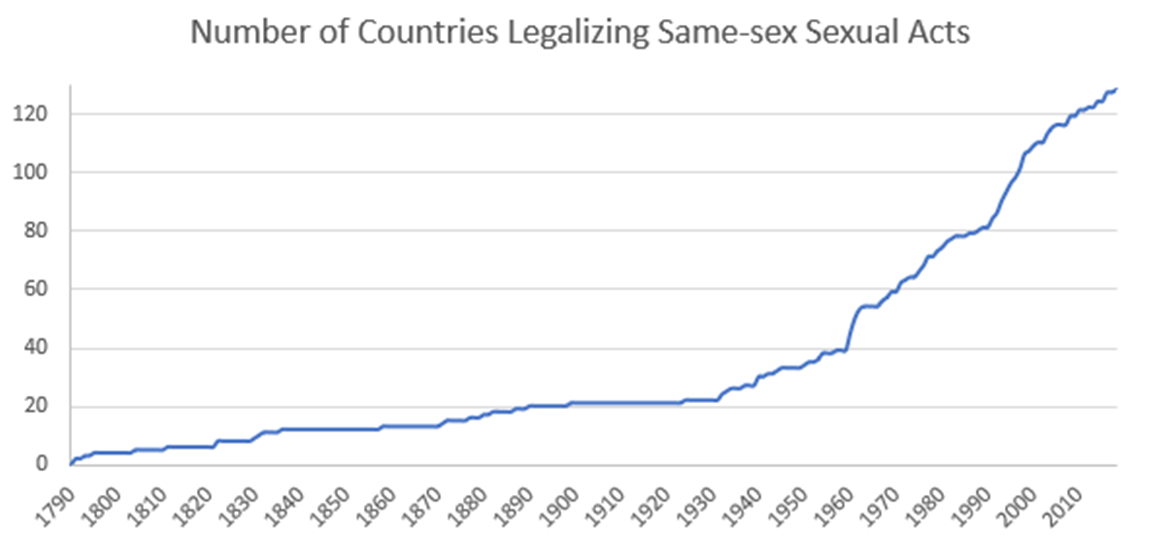Throughout this year, I have looked at a plethora of indicators of human well-being, including growing abundance of resources, declining incidence of child labour, increasing years of schooling, elimination of famines outside of warzones, progress in the battle again malaria, winning the war on HIV/AIDS, and so on. In the final article of 2018, I want to look at decriminalisation of homosexuality.
Homosexuality has existed in all human societies and it is common in the animal kingdom as well. Yet, with a few exceptions, such as ancient Athens, where same-sex attraction between men was tolerated in a highly regulated and restricted form, homosexual behaviour has generally been frowned upon, discouraged and punished. As such, countless gay men and women suffered deep psychological anguish, imprisonment, torture and death on account of their sexual orientation.
Consider Alan Turing, the brilliant British mathematician. At the outbreak of World War II, he joined a team of codebreakers tasked with deciphering German military communications. The main focus of Turing’s efforts was to crack the “Enigma” code. The Enigma was a sophisticated enciphering machine used by the German U-boats, which preyed on convoys carrying war supplies from North America to Britain. The U-boats were so successful at torpedoing the supply vessels that Winston Churchill, the wartime British Prime Minister observed, “The only thing that ever really frightened me during the war was the U-boat peril.”
Turing and his fellow codebreakers developed a machine known as the Bombe, which decoded the enemy signals, allowed for allied convoys to be steered away from the U-boat wolf packs, and won the Battle of the Atlantic. As such, Turing and his fellow codebreakers saved countless lives and shortened World War II by several years.
Paradoxically, it was under Churchill’s second premiership in 1952 that Turing was arrested for homosexuality, which was illegal in Britain. He was found guilty of “gross indecency,” but spared jail in exchange for submitting to chemical castration. Sick and distraught, Turing committed suicide in 1954. Today, Turing is considered the father of the modern computer science and the annual “Turing Award” has been the highest accolade in the world of computing since 1966.
As with so much else, real progress in the treatment of homosexuals started during the Enlightenment, an intellectual movement that popularised the notion that private activities among consenting adults were not anyone else’s business. As the British utilitarian philosopher Jeremy Betham wrote in 1785, “A man’s own feelings, tho’ the best reason in the world for abhorring the thing, are none at all for abhorring the man who does it – how much less then are they for destroying him.” Indeed, “to destroy a man there should certainly be some better reason than mere dislike to his taste, let that dislike be ever so strong.”
France became the first nation to decriminalise homosexual activity in 1791. The Netherlands did so in 1811 and Brazil in 1830. A few more countries followed suit, but it was not until the sexual revolution of the 1960s and the 1970s that decriminalisation of homosexuality gained steam.

The number of countries that have decriminalised homosexual activity has soared since the 1960s.
Attitudes to homosexuality today tends to be highly correlated with the level of urbanisation, education and income. People in urban and intellectually vibrant settings tend to be more frequently exposed to and accepting of unorthodox lifestyles. Similarly, relatively wealthy people, who are no longer concerned with existential challenges, tend to be more concerned with questions of “fairness”.
As New York University psychologist Jonathan Haidt has noted, “As societies get wealthier, life generally gets safer, not just due to reductions in disease, starvation, and vulnerability to natural disasters, but also due to reductions in political brutalisation. People get rights.” This more prosperous generation, then, starts caring about such things as women’s rights, animal rights, gay rights, human rights, and environmental degradation. “They start expecting more out of life than their parents did.”
Out of 195 independent countries in the world today, 128 have decriminalised homosexuality. But progress on gay equality has not been uniform. Homosexuality remains illegal in over 60 countries, with some regions, such as the Middle East and Africa, lagging behind the rest of the world. Also, progress in the treatment of homosexuals has not been irreversible, with notable backsliding in Russia and some African countries in recent years.
Still, when it comes to treatment of homosexuals, increasing urbanisation, education and wealth are likely to make people everywhere more socially tolerant in the future.
This first appeared in CapX.



